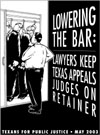Lowering the Bar: Lawyers Keep Texas Appeals Judges on Retainer
II. Introduction: Appeals Courts Go Republican

| [ Lowering the Bar: Lawyers Keep Texas Appeals Judges on Retainer II. Introduction: Appeals Courts Go Republican |
 |
When the judges elected in November 1996 took office in January 1997, Texas’ 14 intermediate appeals courts (with three to 13 justices apiece) stood at a partisan crossroads. Six courts had a Democratic majority, six had a Republican majority and two were split down the middle. Nonetheless, Republicans already claimed 44 of the seats—eight more than the Democrats.After just three more elections, the Republicans had consolidated control of these courts. When judges elected in 2002 took office in January 2003, there were still two appeals courts split down the middle. Yet just two appeals courts had a Democratic majority, with the GOP controlling the remaining 10 courts. In fact, six Republican courts lacked even a token Democratic justice. Republicans had 61 intermediate appeals justices; Democrats had 18. This partisan shift occurred even faster on the all-Republican Texas Supreme Court, which had five Republicans and four Democrats as recently as 1995.
Mixed County: some counties are covered by more than one appeals court.
Republicans Consolidate
Control of Appeals Courts
No. of Dem:Rep Dem:Rep Seats Ratio Ratio District On Bench In '97 In '03 1-Houston 9 4:5 0:9 2-Fort Worth 7 0:7 0:7 3-Austin 6 6:0 3:3 4-San Antonio 7 3:4 2:5 5-Dallas 13 1:12 0:13 6-Texarkana 3 3:0 2:1 7-Amarillo 4 2:2 0:4 8-El Paso 4 2:2 2:2 9-Beaumont 3 3:0 1:2 10-Waco 3 2:1 1:2 11-Eastland† 3 2:1 1:2 12-Tyler 3 1:2 *0:2 13-Corpus 6 6:0 6:0 14-Houston 9 1:8 0:9 80 36:44 *18:61 † District 11 also uses two retired Democratic "senior justices" to relieve case load as needed.
* District 12 had a vacant seat in January 2003.One major Republican Party advantage during this period was its control of the Governor’s Mansion. For the past eight years, Republican Governors George W. Bush and Rick Perry have appointed judges to fill uncompleted judicial terms. These GOP appointees then faced their next election with an incumbent’s advantage. Down-ballot Republicans also got a boost in the 2000 election, when Texan George W. Bush got out the vote by headlining the presidential ballot.
This study looks behind the scenes of Texas’ partisan court battle to reveal who financed 87 recent election campaigns of Texas appeals court justices who still sat on the bench in January 2003.1 The campaigns analyzed here involved still-sitting justices who raised a total of more than $6.8 million to win intermediate appeals court campaigns in the 1996, 1998, 2000 or 2002 election cycles.2
The main findings of this study are that:
By comparison, a recent study found that lawyers and law firms supplied 48 percent of all the campaign money raised by Texas Supreme Court justices.3 Significantly, appeals court judges are increasing their financial dependence on attorneys, who supplied 76 percent of these justices’ campaign money in 2002—up from 61 percent in 1996. Regardless of whether Democrats or Republicans wield a judicial majority, the popular perception that justice is for sale in Texas will persist until Texas judges stop taking campaign money from donors with cases in their courts. Members of the Texas Bar could hasten such reforms by zipping up the main source of conflicted campaign money: their own pockets.
- To win an appeals judge race in the age of George W. Bush, Democratic candidates had to raise an average of 78 percent more money than their Republican counterparts; and
- Lawyers—the very donors who have the greatest recurring interest in the justices’ rulings—accounted for a staggering 72 percent of the money that district appeals court justices raised to get elected.
1 In a method error discovered at press time, this study erroneously includes the 1996 campaign of former Fourth District Chief Justice Phil Hardberger (D), who was not a sitting justice in January 2003. New Chief Justice Alma Lopez (who is properly included in this study) replaced Justice Hardberger when he did not seek reelection in 2002. This error—based on the 2003 edition of the Texas State Directory—has a negligible effect on trends reported in this study.
2 This method excludes nine campaigns in which the winning justice raised no money to get elected, as well as those justices whom governors appointed to finish uncompleted terms.
3 “Checks & Imbalances: How Texas Supreme Court Justices Raised $11 Million,” Texans for Public Justice, April 2000.